接动词不定式的词
动词不定式做定语

动词不定式作定语指的是to do放在名词或者代词后面作后置定语。
翻译:.....的某物;去做某事的.....。
1. 常接动词不定式作后置定语的名词有:time、ability、chance、opportunity、way、courage、plan等例句:I need time to order my thoughts.我需要时间梳理一下思路。
Cycling is a cheap way to get around.骑自行车是一种省钱的旅游方式。
The exhibition gives local artists an opportunity to display their work. 这次展览为当地艺术家提供了展示自己作品的机会。
Is there a plan to work out this?是否打算解决这个问题呢?It takes courage to say what you think.说出你的想法需要勇气。
2. 当名词前面有序数词后置最高级形式的时候,后面常常用动词不定式作定语;例句:He is the first man to come.他是第一个来的人。
He'd always be the first person to offer to help.他总是第一个主动提出帮忙。
He was the last man to blame.他是最不应该受到责备的人。
3. 名词前面有enough、very、only修饰的时候,后面常常接动词不定式;例句:There is enough room to place the piano.这里有足够的空间可以放置这架钢琴。
There isn't enough room to hold so many people.这没有足够的地方容纳这么多人。
There is enough room to hold these people to have a meeting.有足够的地方容下这些人开会。
动词后接动词不定式/动名词作宾语用法小结
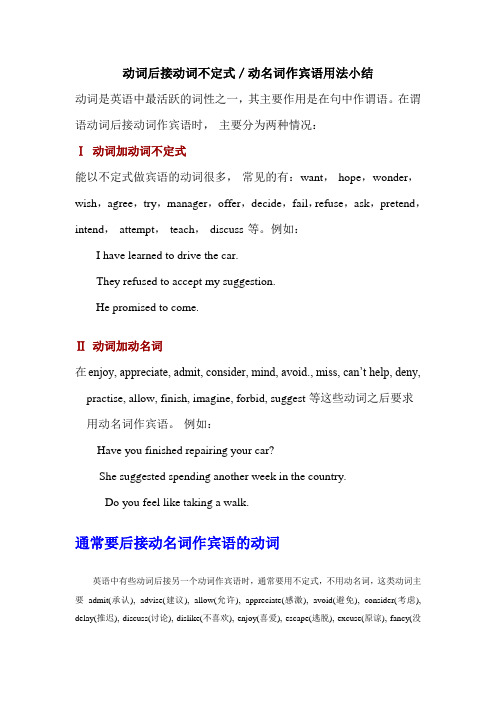
动词后接动词不定式/动名词作宾语用法小结动词是英语中最活跃的词性之一,其主要作用是在句中作谓语。
在谓语动词后接动词作宾语时,主要分为两种情况:Ⅰ动词加动词不定式能以不定式做宾语的动词很多,常见的有:want,hope,wonder,wish,agree,try,manager,offer,decide,fail,refuse,ask,pretend,intend,attempt,teach,discuss等。
例如:I have learned to drive the car.They refused to accept my suggestion.He promised to come.Ⅱ动词加动名词在enjoy, appreciate, admit, consider, mind, avoid., miss, can’t help, deny, practise, allow, finish, imagine, forbid, suggest等这些动词之后要求用动名词作宾语。
例如:Have you finished repairing your car?She suggested spending another week in the country.Do you feel like taking a walk.通常要后接动名词作宾语的动词英语中有些动词后接另一个动词作宾语时,通常要用不定式,不用动名词,这类动词主要admit(承认), advise(建议), allow(允许), appreciate(感激), avoid(避免), consider(考虑), delay(推迟), discuss(讨论), dislike(不喜欢), enjoy(喜爱), escape(逃脱), excuse(原谅), fancy(没想到), finish(完成), forbid(禁止), forgive(原谅), give up(放弃), imagine(想像), keep(保持), mention(提及), mind(介意), miss(没赶上), pardon(原谅), permit(允许), practise(练习), prevent(阻止), put off(推迟), report(报告), resist(忍住), risk(冒险), stop(停止), suggest(建议), understand(理解)等。
后接动名不定式的动词

后接动名词的动词admit 承认 / advise 建议 / allow 允许 / appreciate 感激 / avoid 避免 / consider 考虑 / delay 推迟 / deny 否认 / discuss 讨论 / dislike 不喜欢 / enjoy 喜爱 / escape 逃脱 / excuse 原谅 / fancy 设想 / finish 完成 / forbid 禁止 / forgive 原谅 / imagine 想像 / keep 保持 / mention 提及 / mind 介意 / miss 没赶上 / pardon 原谅 / permit 允许 / practise 练习 / prevent 阻止 / prohibit 禁止 / put off 推迟 / report 报告 / risk 冒险 / stop 停止 / suggest 建议 / carry on 继续/ can’t help 禁不住 / feel like 想要 / give up 放弃 / keep on 继续/ put off 推迟 / set about 开始,着手 / object to 反对 / insist on 坚持 / pay attention to 注意 / stick to 坚持 / get down to 开始认真做 / look forwards to 期盼 / be [get] used to 习惯于 / lead to 导致 / be devoted to 致力于,专用于,后接不定式作宾语的动词afford 负担得起 / arrange 安排 / ask 要求 / care 想要 / choose 决定 / decide 决定 / demand 要求 / determine 决心 / expect 期待,预计 / help 帮助 / hesitate 犹豫 / hope 希望 / long 渴望 / manage 渴望设法 / offer 主动提出 / plan 计划 / prepare 准备 / pretend 假装 / promise 答应 / refuse 拒绝 / want 想要 / wish 希望,既可接动名词也可接不定式作宾语但意义不同的动词(1)remember(记得),forget(忘记),regret(后悔)后接不定式指该不定式所表示的动作还未发生,后接动名词(有时可用完成式),则指该动名词所表示的动作已经发生。
动词不定式固定搭配

一. 只接不定式(不能接动名词)作宾语的25个常用动词1. want to do sth. 想要做某事I want to buy a new computer this afternoon.我想今天下午买台新电脑。
2. would like to do sth.想要做某事I would like to invite you to come to my birthday party this Saturday. 我想邀请你这周六来我的聚会。
3. wish to do sth. 希望做某事I wish to live on the moon one day.我希望有一天在月球上生活。
4. help to do sth. 帮助做某事I often help to do some chores at home.我在家经常帮着做家务。
5. hope to do sth. 希望做某事I hope to have a good rest this weekend.我希望这周末好好休息一下。
6. learn to do sth. 学会做某事He finally learned to play the piano with the help of the teacher. 在老师的帮助下,他最终学会了弹钢琴。
7. manage to do sth. 设法做成某事They managed to escape the fire yesterday.昨天他们设法逃脱了火灾。
8. offer to do sth. 主动提出做某事Never offer to teach fish to swim.别在强人面前逞能。
9. plan to do sth. 计划做某事He plans to travel around the world.他计划要周游世界。
10. afford to do sth. 负担得起做某事(时间或金钱方面)We can’t afford to go abroad this summer.今年夏天我们没有足够的钱出国。
接动词不定式的单词及例句

1.afford:买的起,(有时间/金钱)做,能做afford to do sth.: 承担得起...的后果We can’t afford to go abroad this summer.今年夏天我们没有足够的钱去国外2 aim to do sth. 力求达到,力求做到They are aiming to reduce unemployment by 50%.他们力求使失业人数下降50%3 appear看来好像出现She appeared to be in her late thirties. 看样子她快四十了4 arrange安排筹备(=plan)Have you arranged to meet him? 你安排好去见他了吗?bother花费时间精力(做某事);使(某人)烦恼5.It bothers me to think of her alone in that big house.想到她孤零零的地待在那所大房子里我便坐立不安。
6 decide决定、decide to do sth 决定做某事We’ve decided not to go after all. 我们到底还是决定不离开。
7 demand 强烈要求I demand to see the manager. 我坚决要求见经理。
8 desire 愿望渴望欲望Fewer people desire to live in the north of the country.想住在这个国家北部的人就更少了。
9determine to do sth 决定决心(做某事)They determined to start early. 他们决定早点出发。
10 expect 预料预期House prices are expected to rise sharply.预计房价会急剧上涨I didn’t expect him to be a successful writer.11 elect to do sth 选择决定做某事Increasing number of people elect to work at home nowadays现在越来越多的人选择在家工作。
英语语法顺口溜:接不定式作宾语的动词背诵口诀及用法
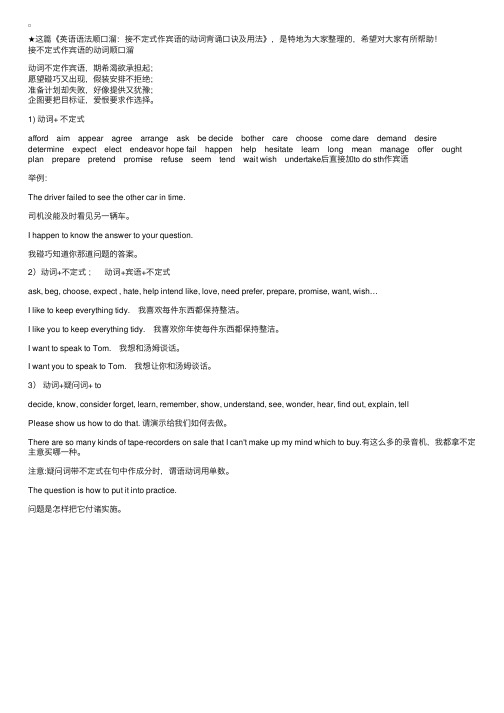
★这篇《英语语法顺⼝溜:接不定式作宾语的动词背诵⼝诀及⽤法》,是特地为⼤家整理的,希望对⼤家有所帮助!接不定式作宾语的动词顺⼝溜动词不定作宾语,期希渴欲承担起;愿望碰巧⼜出现,假装安排不拒绝;准备计划却失败,好像提供⼜犹豫;企图要把⽬标证,爱恨要求作选择。
1) 动词+ 不定式afford aim appear agree arrange ask be decide bother care choose come dare demand desire determine expect elect endeavor hope fail happen help hesitate learn long mean manage offer ought plan prepare pretend promise refuse seem tend wait wish undertake后直接加to do sth作宾语举例: The driver failed to see the other car in time.司机没能及时看见另⼀辆车。
I happen to know the answer to your question.我碰巧知道你那道问题的答案。
2)动词+不定式; 动词+宾语+不定式ask, beg, choose, expect , hate, help intend like, love, need prefer, prepare, promise, want, wish…I like to keep everything tidy. 我喜欢每件东西都保持整洁。
I like you to keep everything tidy. 我喜欢你年使每件东西都保持整洁。
I want to speak to Tom. 我想和汤姆谈话。
I want you to speak to Tom. 我想让你和汤姆谈话。
动词不定式
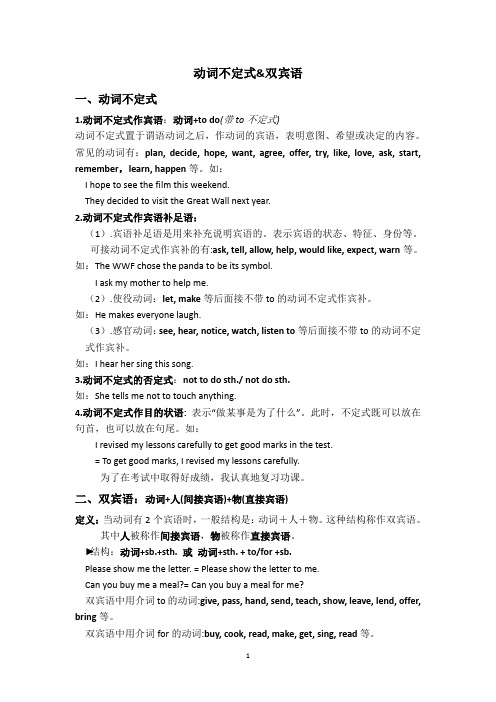
动词不定式&双宾语一、动词不定式1.动词不定式作宾语:动词+to do(带to不定式)动词不定式置于谓语动词之后,作动词的宾语,表明意图、希望或决定的内容。
常见的动词有:plan, decide, hope, want, agree, offer, try, like, love, ask, start, remember,learn, happen等。
如:I hope to see the film this weekend.They decided to visit the Great Wall next year.2.动词不定式作宾语补足语:(1).宾语补足语是用来补充说明宾语的。
表示宾语的状态、特征、身份等。
可接动词不定式作宾补的有:ask, tell, allow, help, would like, expect, warn等。
如:The WWF chose the panda to be its symbol.I ask my mother to help me.(2).使役动词:let, make等后面接不带to的动词不定式作宾补。
如:He makes everyone laugh.(3).感官动词:see, hear, notice, watch, listen to等后面接不带to的动词不定式作宾补。
如:I hear her sing this song.3.动词不定式的否定式:not to do sth./ not do sth.如:She tells me not to touch anything.4.动词不定式作目的状语:表示“做某事是为了什么”。
此时,不定式既可以放在句首,也可以放在句尾。
如:I revised my lessons carefully to get good marks in the test.= To get good marks, I revised my lessons carefully.为了在考试中取得好成绩,我认真地复习功课。
常用36个动词接不定式作宾语的用法
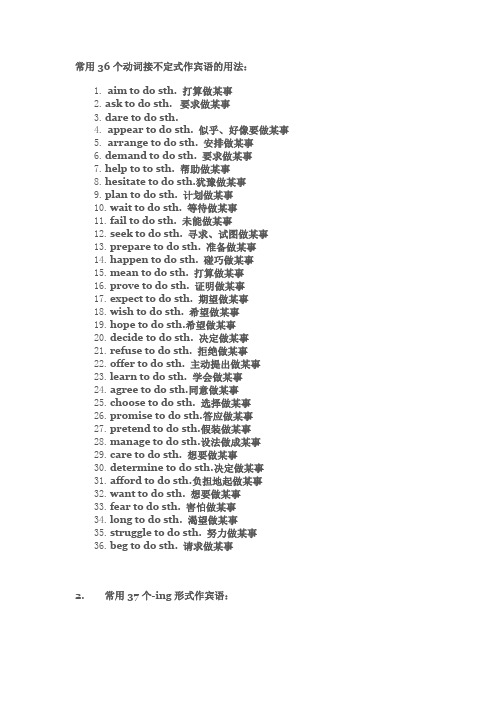
常用36个动词接不定式作宾语的用法:1.aim to do sth.打算做某事2.a sk to do sth. 要求做某事3.d are to do sth.4.appear to do sth.似乎、好像要做某事5.arrange to do sth.安排做某事6.d emand to do sth.要求做某事7.h elp to to sth.帮助做某事8.h esitate to do sth.犹豫做某事9.p lan to do sth.计划做某事10.w ait to do sth.等待做某事11.f ail to do sth.未能做某事12.s eek to do sth.寻求、试图做某事13.p repare to do sth.准备做某事14.h appen to do sth.碰巧做某事15.m ean to do sth.打算做某事16.p rove to do sth.证明做某事17.e xpect to do sth.期望做某事18.w ish to do sth.希望做某事19.h ope to do sth.希望做某事20.d ecide to do sth.决定做某事21.r efuse to do sth.拒绝做某事22.o ffer to do sth.主动提出做某事23.l earn to do sth.学会做某事24.a gree to do sth.同意做某事25.c hoose to do sth.选择做某事26.p romise to do sth.答应做某事27.p retend to do sth.假装做某事28.m anage to do sth.设法做成某事29.c are to do sth.想要做某事30.d etermine to do sth.决定做某事31.a fford to do sth.负担地起做某事32.w ant to do sth.想要做某事33.f ear to do sth.害怕做某事34.l ong to do sth.渴望做某事35.s truggle to do sth.努力做某事36.b eg to do sth.请求做某事2. 常用37个-ing形式作宾语:1.a dmit doing sth.承认做某事2.r eport doing sth.报告做某事3.a ppreciate doing sth.感激做某事4.d eny doing sth.否认做某事5.e xplain doing sth.解释做某事6.m ention doing sth.提及做某事7.r esist doing sth.拒绝做某事8.s tand doing sth.忍受做某事9.s top doing sth.停止做某事10.i magine doing sth..想象做某事11.r ecall doing sth.想起做某事12.s uggest doing sth.建议做某事13.m ind doing sth.介意做某事14.f inish doing sth.完成做某事15.e njoy doing sth.喜欢做某事16.k eep doing sth.继续做某事17.p ractise doing sth.练习做某事18.m issing doing sth.错过做某事19.a void doing sth.避免做某事20.d elay doing sth.推迟做某事21.e xcuse doing sth.借口做某事22.e scape doing sth.逃脱做某事23.c onsider doing sth.考虑做某事24.a dvise doing sth.建议做某事25.a llow doing sth.允许做某事26.d iscuss doing sth.讨论做某事27.d islike doing sth.讨厌做某事28.f ancy doing sth.设想做某事29.f orbid doing sth.禁止做某事30.p ardon doing sth.原谅做某事31.p ermit doing sth.允许做某事32.p revent doing sth.阻止做某事33.p rohibit doing sth.禁止做某事34.r isk doing sth.冒险做某事35.u nderstand doing sth.理解做某事36.g ive up doing sth.放弃做某事37.p ut off doing sth.推迟做某事3. 接不定式与-ing形式意义相近的12个动词:like, love, hate,begin , start ,prefer to do sth. / prefer doing sth. continue, intendattempt, bother(麻烦),can’t bear to do sth. / doing sth.4. 接不定式作宾语补足语的36个常用动词1.a dvise sb. to do sth.建议某人做某事2.l eave sb.to do sth.留下某人做某事3.a llow sb.to do sth.允许某人做某事4.l ike sb. to do sth.喜欢某人做某事5.a sk sb. to do sth.要求某人做某事6.m ean sb. to do sth.打算某人做某事7.b ear sb. to do sth.忍受某人做某事8.n eed sb.to do sth.需要做某事9.b eg sb. to do sth. 请求某人做某事10.o blige (迫使)11.c ause(导致)12.o rder ,13.c ommand(命令),14.p ermit,15.d rive(驱使),16.p ersuade,17.e lect (选举) ,18.p refer,19.e ncourage,20.r equest (要求) ,21.e xpect,22.r emind(提醒),23.f orbid,24.t each,25.f orce,26.t ell,27.g et(使)28.t rain(训练)29.h ate,30.t rouble (麻烦)31.h elp ,32.w ant ,33.i ntend ,34.w arn(警告)35.i nvite36.w ish.5. 接现在分词作宾语补足语的20个常用短语:1.b ring sb. doing sth.引起某人做某事2.l ook at sb. doing sth.看着某人做某事3.c atch sb. doing sth.碰上某人做某事4.n otice sb. doing sth.注意到某人做某事5.d iscover sb. doing sth.发现某人做某事6.o bserve sb.doing sth.观察某人做某事7.f eel sb. doing sth.感觉某人做某事8.p revent sb. doing sth.阻止某人做某事9.f ind sb. doing sth.发现(碰上)某人做某事10.s ee sb. doing sth.看见某人做某事11.g et sb. doing sth.使某人做某事12.s end sb. doing sth,使某人(突然)做某事13.h ave sb. doing sth.使某人做某事14.s et sb. doing sth.使(引起)某人做某事15.h ear sb. doing sth.听见某人做某事16.start sb. doing sth.使某人开始做某事17.k eep sb doing sth.使某人不停地做某事18.s top sb doing sth.阻止某人做某事19.l isten to sb. doing sth.听某人做某事20.w atch sb. doing sth.观看某人做某事6. 接动词原形作宾语补足语的11个动词:1.f eel sb. do sth. 感觉某人做某事2.l et ,3.h ave ,4.l isten to ,5.h ear ,6.l ook at ,7.m ake ,8.n otice ,9.o bserve,10.w atch ,11.s ee7. 接双宾语的38个常用动词1)双宾语易位时需要借助介词to的常用动词:1.a ward sb.sth. / sth. to sb. 颁奖给某人2.r eturn(归还),3.b ring,4.s end,5.h and ,6.s ell ,7.l end,8.s erve(招待),9.m ail (邮),10.s how ,11.o ffer,12.t ake,13.o we(欠)14.t each,15.p ass ,16.t ell ,17.p ay,18.t hrow ,19.p ost,20.w rite ,21.r ead .2)双宾语易位时需要借助介词for的常用动词17个:1.b ook sb. sth. / sth. for sb.为某人预订某物2.m ake sb. sth./ sth. for sb.为某人做某事3.b uy ,4.o rder ,5.c hoose ,6.p ick,7.c ook ,8.p repare ,9.d raw,10.s ave,11.f etch(取),12.s ing,13.f ind,14.s pare(为某人让出某物),15.f ix sb.sth./sth. for sb. (为某人准备某物),16.s teal ,17.g et (为某人拿来某物)。
后接动词不定式的结构大全

1.help sb (to) do 帮助某人做某事help with sth 在某方面帮助She often helps me with my English / (to) learn English. 2.teach sb to do sth 教某人做某事teach oneself = learn...by oneself 自学I taught myself French.= I learned French by myself.3.learn to do 学习去做某事4.lead sb to do sth 引导某人做某事What led you to think so?5.guide sb to do sth 指导某人去做某事He can guide you to find the way.Mr. Brown guide me to do a lot better in science.6.volunteer to do sth 自愿做某事7.(can’t)afford to do sth 买得起、能承受/负担得起做某事We can’t afford to wait any longer.8.attempt to do尝试做某事9.agree to do sth 同意去做某事agree with sb 同意某人的观点10.decide/make a decision to do sth 决定去做某事11.prepare to do sth 准备去做某事prepare for sth 为...做准备I have to prepare for the exam.12.have to do sth 必须/不得不做某事13.manage to do 设法做成某事14.promise to do 承诺做某事15.fail to do sth 未能做某事16.allow sb to do sth 允许某人做某事被动be allowed to do sth17.encourage sb to do sth 鼓励某人做某事My father encourages me to study hard.18.persuade sb (not) to do sth = persuade sb into/out of doing sth说服/劝说某人做某事19.prefer sb to do sth 宁愿/更希望某人做某事We prefer you to attend the wedding. 我们更希望你参加这个婚礼。
接不定式和v-ing 动词口诀
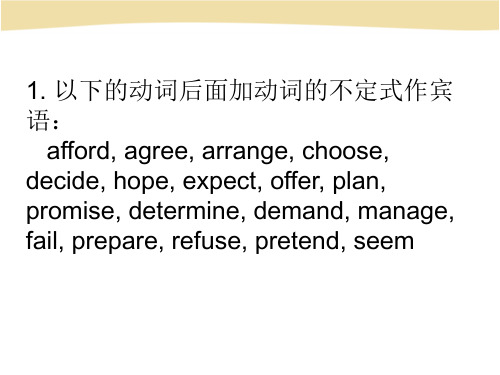
2.以下的动词后面加动词的ing作宾语: admit, advise, allow, appreciate, avoid, complete, consider, delay, deny, enjoy, escape, finish, imagine, keep, mind, miss, practice, suggest, stop , can’t stand, can’t help, be worth
常跟动词ing作宾语的动词歌诀: 考虑建议盼原谅,承认推迟没得想, 避免错过继续练,否认完成停能赏, 不禁介意准逃亡,不准冒险凭想象。
consider, suggest / advise ,look forward to ,excuse ,pardon ,admit, delay / put off , fancy, avoid , miss ,keep /keep on ,practise deny , finish , stop ,enjoy / appreciate can’t help , mind , allow/ permit ,escape,forbid , risk , imagine
常跟不定式作宾语的动词歌诀: 三个希望两答应,两个要求莫拒绝, 设法学会做决定, 不要假装在选择。 hope; wish; want ; agree; promise; demand; ask; refuse ; manage; learn; decide; pretend ; choose 想要拒绝命令, 需要努力学习, 期望同意帮助, 希望决定开始。 want ; refuse ; order need; try ; learn expect ; agree ; help hope ; wish ; decide ; begin ;start
动词不定式的固定搭配
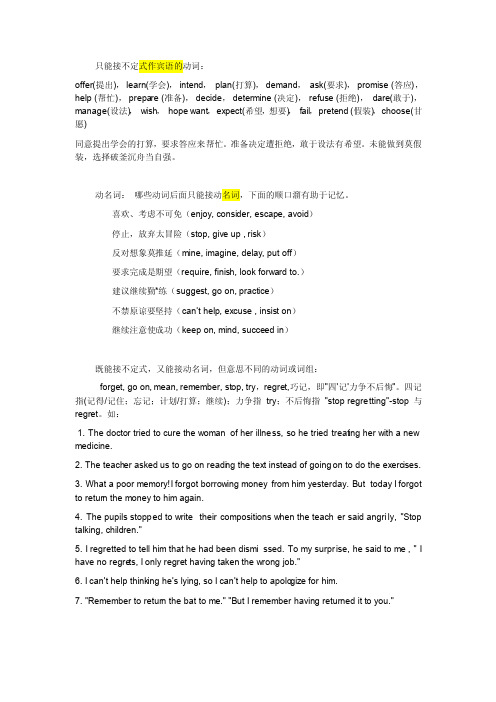
只能接不定式作宾语的动词:offer(提出), learn(学会), intend,plan(打算), demand,ask(要求), promis e (答应),help (帮忙), prepar e (准备), decide, determ ine (决定), refuse (拒绝),dare(敢于),manage(设法),wish,hope want, expect(希望,想要),fail, preten d (假装), choose(甘愿)同意提出学会的打算,要求答应来帮忙。
准备决定遭拒绝,敢于设法有希望。
未能做到莫假装,选择破釜沉舟当自强。
动名词:哪些动词后面只能接动名词,下面的顺口溜有助于记忆。
喜欢、考虑不可免(enjoy, consid er, escape, avoid)停止,放弃太冒险(stop, give up , risk)反对想象莫推延(mine, imagin e, delay, put off)要求完成是期望(requir e, finish, look forwar d to.)建议继续勤*练(sugges t, go on, practi ce)不禁原谅要坚持(can’thelp, excuse , insist on)继续注意使成功(keep on, mind, succee d in)既能接不定式,又能接动名词,但意思不同的动词或词组:forget, go on, mean, rememb er, stop, try,regret,巧记,即"四'记'力争不后悔"。
四记指(记得/记住;忘记;计划/打算;继续);力争指try;不后悔指"stop regret ting"-stop 与regre t。
初中英语接不定式作宾语的常用动词

初中英语接不定式作宾语的常用动词初中英语中,常用动词接不定式作宾语的有以下几种:1. like(喜欢):I like to play soccer.2. love(爱):She loves to dance.3. hate(讨厌):They hate to clean the house.4. want(想要):He wants to go to the park.5. need(需要):We need to buy some groceries.6. prefer(更喜欢):She prefers to stay at home on weekends.7. enjoy(喜欢,享受):They enjoy listening to music.8. plan(计划):We plan to have a picnic next weekend.9. hope(希望):He hopes to become a doctor in the future.10. decide(决定):They have decided to travel to Europe this summer.11. learn(学习):She wants to learn how to play the piano.12. try(尝试):He will try to solve the math problem.13. start(开始):We should start to do our homework.14. continue(继续):He continues to practice playing the guitar.15. stop(停止):They stopped to rest for a while.以上是初中英语中常用动词接不定式作宾语的一些例子,希望对你有帮助!。
动词不定式和动名词做宾语的区别

动词不定式和动名词做宾语的区别一、只能接动词不定式to do(作宾语)的动词:hope, expect, agree, promise, intend, plan, want, manage, decide, determine,attempt, pretend, choose,offer, refuse, fail 等。
例如:They all want to play football after class.二、1.只能接动词-ing形式(作宾语)的动词(短语):finish,mind ,admit ,allow ,appreciate ,avoid ,consider ,delay ,enjoy ,imagine ,keep ,miss ,permit practise , risk ,suggest 等。
例如:I admit breaking the window.2.有些短语动词和结构后面也要求跟动名词作宾语。
这样的短语动词常见的有:insist on, be worth,give up,put off,keep on,insist on,look forward to,can't help, be/get used to,spend...in , feel like 等3.在一些特别的句子结构中要求使用动名词:1.) “have problem (+in) + 动名词,2.) have difficulty in doing sth.,3.) be busy (in) + 动名词;4.) waste time (in) + 动名词;5.) There is no use + doing三、在remember,forget, regret, stop,mean 等及物动词后,既可接doing作宾语又可接to do作宾语,但意义不同。
动名词作主语(如果一个动词加上了ing变成了名词,那么这个词称动名词)动名词作主语有如下几种常见情况:1. 直接位于句首做主语。
动词不定式的固定搭配
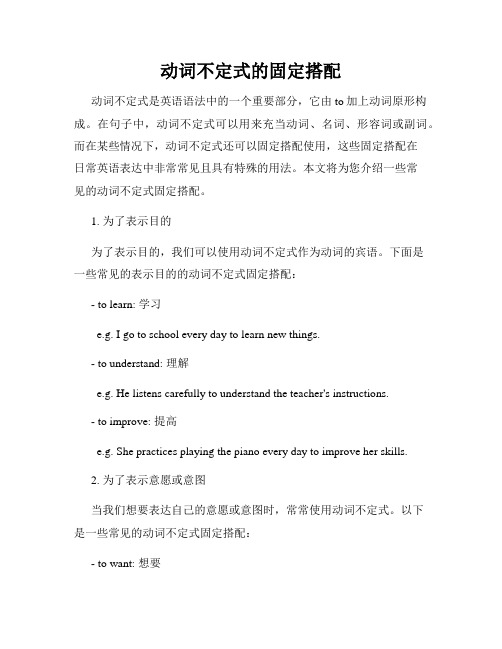
动词不定式的固定搭配动词不定式是英语语法中的一个重要部分,它由to加上动词原形构成。
在句子中,动词不定式可以用来充当动词、名词、形容词或副词。
而在某些情况下,动词不定式还可以固定搭配使用,这些固定搭配在日常英语表达中非常常见且具有特殊的用法。
本文将为您介绍一些常见的动词不定式固定搭配。
1. 为了表示目的为了表示目的,我们可以使用动词不定式作为动词的宾语。
下面是一些常见的表示目的的动词不定式固定搭配:- to learn: 学习e.g. I go to school every day to learn new things.- to understand: 理解e.g. He listens carefully to understand the teacher's instructions.- to improve: 提高e.g. She practices playing the piano every day to improve her skills.2. 为了表示意愿或意图当我们想要表达自己的意愿或意图时,常常使用动词不定式。
以下是一些常见的动词不定式固定搭配:- to want: 想要e.g. I want to travel around the world someday.- to hope: 希望e.g. They hope to win the championship this year.- to plan: 计划e.g. We plan to go hiking during the summer vacation.3. 为了表示能力或能力不足当我们想要表达自己或他人的能力或能力不足时,可以使用动词不定式。
以下是一些常见的动词不定式固定搭配:- to be able to: 能够e.g. She is able to speak three languages fluently.- to fail to: 未能e.g. They failed to finish the project on time.- to hesitate to: 犹豫e.g. He hesitated to jump into the cold water.4. 为了表示喜好或厌恶当我们想要表达自己的喜好或厌恶时,动词不定式也是一个常见的选择。
初中阶段常用后接动词不定式(to do)的动词汇总
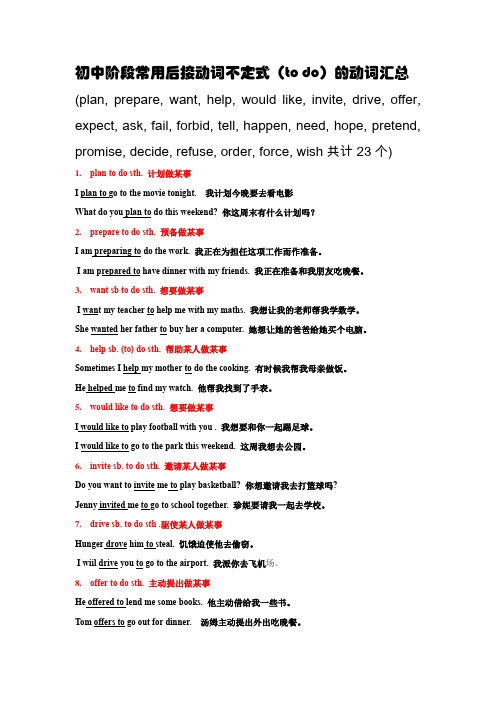
初中阶段常用后接动词不定式(to do)的动词汇总(plan, prepare, want, help, would like, invite, drive, offer, expect, ask, fail, forbid, tell, happen, need, hope, pretend, promise, decide, refuse, order, force, wish共计23个)1.plan to do sth. 计划做某事I plan to go to the movie tonight. 我计划今晚要去看电影What do you plan to do this weekend? 你这周末有什么计划吗?2.prepare to do sth. 预备做某事I am preparing to do the work. 我正在为担任这项工作而作准备。
I am prepared to have dinner with my friends. 我正在准备和我朋友吃晚餐。
3.want sb to do sth. 想要做某事I want my teacher to help me with my maths. 我想让我的老师帮我学数学。
She wanted her father to buy her a computer. 她想让她的爸爸给她买个电脑。
4.help sb. (to) do sth. 帮助某人做某事Sometimes I help my mother to do the cooking. 有时候我帮我母亲做饭。
He helped me to find my watch. 他帮我找到了手表。
5.would like to do sth. 想要做某事I would like to play football with you . 我想要和你一起踢足球。
I would like to go to the park this weekend. 这周我想去公园。
接动词不定式和动名词的动词汇总
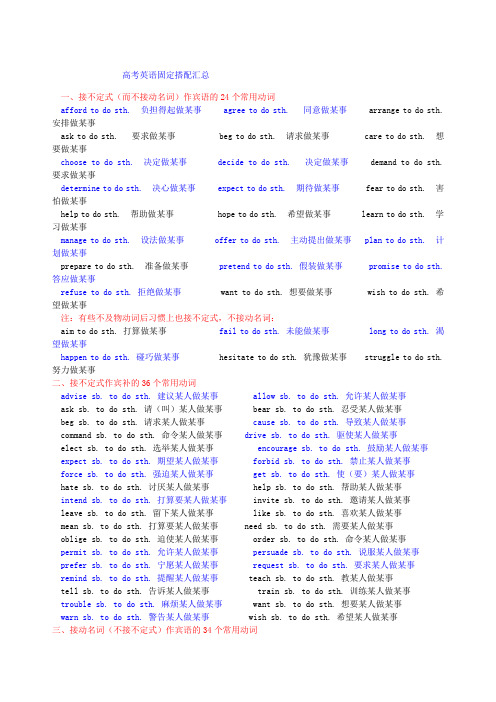
高考英语固定搭配汇总一、接不定式(而不接动名词)作宾语的24个常用动词afford to do sth. 负担得起做某事 agree to do sth. 同意做某事arrange to do sth. 安排做某事ask to do sth. 要求做某事 beg to do sth. 请求做某事 care to do sth. 想要做某事choose to do sth. 决定做某事 decide to do sth. 决定做某事demand to do sth. 要求做某事determine to do sth. 决心做某事 expect to do sth. 期待做某事fear to do sth. 害怕做某事help to do sth. 帮助做某事 hope to do sth. 希望做某事 learn to do sth. 学习做某事manage to do sth. 设法做某事 offer to do sth. 主动提出做某事 plan to do sth. 计划做某事prepare to do sth. 准备做某事pretend to do sth. 假装做某事promise to do sth. 答应做某事refuse to do sth. 拒绝做某事want to do sth. 想要做某事wish to do sth. 希望做某事注:有些不及物动词后习惯上也接不定式,不接动名词:aim to do sth. 打算做某事fail to do sth. 未能做某事long to do sth. 渴望做某事happen to do sth. 碰巧做某事hesitate to do sth. 犹豫做某事struggle to do sth. 努力做某事二、接不定式作宾补的36个常用动词advise sb. to do sth. 建议某人做某事 allow sb. to do sth. 允许某人做某事ask sb. to do sth. 请(叫)某人做某事 bear sb. to do sth. 忍受某人做某事beg sb. to do sth. 请求某人做某事cause sb. to do sth. 导致某人做某事command sb. to do sth. 命令某人做某事drive sb. to do sth. 驱使某人做某事elect sb. to do sth. 选举某人做某事encourage sb. to do sth. 鼓励某人做某事expect sb. to do sth. 期望某人做某事 forbid sb. to do sth. 禁止某人做某事force sb. to do sth. 强迫某人做某事 get sb. to do sth. 使(要)某人做某事hate sb. to do sth. 讨厌某人做某事 help sb. to do sth. 帮助某人做某事intend sb. to do sth. 打算要某人做某事invite sb. to do sth. 邀请某人做某事leave sb. to do sth. 留下某人做某事 like sb. to do sth. 喜欢某人做某事mean sb. to do sth. 打算要某人做某事 need sb. to do sth. 需要某人做某事oblige sb. to do sth. 迫使某人做某事 order sb. to do sth. 命令某人做某事permit sb. to do sth. 允许某人做某事 persuade sb. to do sth. 说服某人做某事prefer sb. to do sth. 宁愿某人做某事 request sb. to do sth. 要求某人做某事remind sb. to do sth. 提醒某人做某事teach sb. to do sth. 教某人做某事tell sb. to do sth. 告诉某人做某事 train sb. to do sth. 训练某人做某事trouble sb. to do sth. 麻烦某人做某事 want sb. to do sth. 想要某人做某事warn sb. to do sth. 警告某人做某事wish sb. to do sth. 希望某人做某事三、接动名词(不接不定式)作宾语的34个常用动词admit doing sth. 承认做某事 advise doing sth. 建议做某事 allow doing sth. 允许做某事appreciate doing sth. 感激做某事 avoid doing sth. 避免做某事 consider doing sth. 考虑做某事delay doing sth. 推迟做某事 deny doing sth. 否认做某事 discuss doing sth. 讨论做某事dislike doing sth. 不喜欢做某事 enjoy doing sth. 喜爱做某事 escape doing sth. 逃脱做某事excuse doing sth. 原谅做某事 fancy doing sth. 设想做某事 finish doing sth. 完成做某事forbid doing sth. 禁止做某事 forgive doing sth. 原谅做某事 give up doing sth. 放弃做某事imagine doing sth. 想象做某事 keep doing sth. 保持做某事 mention doing sth. 提及做某事mind doing sth. 介意做某事 miss doing sth. 错过做某事 pardon doing sth. 原谅做某事permit doing sth. 允许做某事 practice doing sth. 练习做某事 prevent doing sth. 阻止做某事prohibit doing sth. 禁止做某事 put off doing sth. 推迟做某事 report doing sth. 报告做某事risk doing sth. 冒险做某事 stop doing sth. 停止做某事 suggest doing sth. 建议做某事understand doing sth. 理解做某事四、接现在分词作宾补的20个常用动词bring sb. doing sth.引起某人做某事catch sb. doing sth. 碰上(撞上)某人做某事discover sb. doing sth. 发现某人做某事 feel sb. doing sth. 感觉某人做某事find sb. doing sth. 碰上(撞上)某人做某事get sb. doing sth. 使某人做某事have sb. doing sth. 使某人做某事hear sb. doing sth. 听见某人做某事keep sb. doing sth. 使某人不停地做某事 listen to sb. doing sth. 听某人做某事look at sb. doing sth. 看着某人做某事 notice sb. doing sth. 注意到某人做某事 observe sb. doing sth. 观察某人做某事 prevent sb. doing sth. 阻止某人做某事see sb. doing sth. 看见某人做某事send sb. doing sth.使某人(突然)做某事set sb. doing sth. 使(引起)某人做某事start sb. doing sth. 使某人开始做某事 stop sb. doing sth. 阻止某人做某事 watch sb. doing sth. 观察某人做某事五、接动词原形作宾补的11个常用动词feel sb. do sth. 感觉某人做某事have sb. do sth. 使某人做某事hear sb. do sth. 听见某人做某事 let sb. do sth.让某人做某事listen to sb. do sth. 听着某人做某事 look at sb. do sth. 看着某人做某事make sb. do sth. 使某人做某事notice sb. do sth. 注意某人做某事observe sb. do sth. 观察某人做某事 see sb. do sth. 看见某人做某事watch sb. do sth. 观察某人做某事接不定式或动名词作宾语意思不同的8个动词(1)remember/forget/regret to do 记住/忘记/后悔(遗憾)要做某事remember/forget/regret doing 记住/忘记/后悔(遗憾)曾做过某事(2)try to do sth. 设法要做某事try doing sth. 尝试做某事(3)mean to do sth. 打算做某事mean doing sth. 意味着做某事(4)can’t help to do sth. 不能帮助做某事can’t help doing sth. 情不自禁做某事(5)go on to do sth. 做完某事后接着做另一事go on doing sth. 继续做一直在做的事(6)stop to do sth. 停止正在做的事stop doing sth. 停下来去做另一事。
(完整版)动词不定式的固定搭配

只能接不定式作宾语的动词:offer(提出),learn(学会),intend,plan(打算),demand,ask(要求),promise (答应),help (帮忙),prepare (准备),decide,determine (决定),refuse (拒绝),dare(敢于),manage(设法),wish,hope want,expect(希望,想要),fail,pretend (假装),choose(甘愿)同意提出学会的打算,要求答应来帮忙。
准备决定遭拒绝,敢于设法有希望。
未能做到莫假装,选择破釜沉舟当自强。
动名词:哪些动词后面只能接动名词,下面的顺口溜有助于记忆。
喜欢、考虑不可免(enjoy, consider, escape, avoid)停止,放弃太冒险(stop, give up , risk)反对想象莫推延(mine, imagine, delay, put off)要求完成是期望(require, finish, look forward to.)建议继续勤*练(suggest, go on, practice)不禁原谅要坚持(can’t help, excuse , insist on)继续注意使成功(keep on, mind, succeed in)既能接不定式,又能接动名词,但意思不同的动词或词组:forget, go on, mean, remember, stop, try,regret,巧记,即"四'记'力争不后悔"。
四记指(记得/记住;忘记;计划/打算;继续);力争指try;不后悔指"stop regretting"-stop 与regret。
如:1. The doctor tried to cure the woman of her illness, so he tried treating her with a new medicine.2. The teacher asked us to go on reading the text instead of going on to do the exercises.3. What a poor memory!I forgot borrowing money from him yesterday. But today I forgot to return the money to him again.4. The pupils stopped to write their compositions when the teacher said angrily, "Stop talking, children."5. I regretted to tell him that he had been dismissed. To my surprise, he said to me, " I have no regrets, I only regret having taken the wrong job."6. I can't help thinking he's lying, so I can't help to apologize for him.7. "Remember to return the bat to me." "But I remember having returned it to you."一. 出现以下词,用do填空:can , could, may, must, need, had better, why not, make, have to, let's, see, hear, watch, notice, Will ( Would ) you please…, help do, help sb do.二. 出现以下词,用to do 填空:would like, want, begin, start, hope, decide, ask, wish, have something to do, tell, take time, it's time, remember, forget, learn, teach, try, stop, plan, adj./疑问词后,take ,allow sb to do, It's +形容词+to do something, know, refuse, invite , get order, like, offer, lend, make up one's mind to do, set one's mind to do, enough, need ,help to do,help sb to do,三. 出现以下词,用doing 填空:allow doing,finish, like, enjoy, mind, keep, be busy, there be, do some…, go doing, prevent, be worth, spend, practice, feel like, thank somebody for doing something ,stop, excuse somebody for doing somet hing, can't help, prefer… to…,look forward to…hate, mention, have fun doing,介词:at, in, on, of, from, for, about, with, without, ,make a contribution to, be used to, hear, see, watch, notice, listen, can't help doing。
可用不定式宾语补足语的动词

用不定式的动词:一.接不定式: agree, decide, dare, expect, fail, hope, learn, lmanage, plan, pretend, promise, refuse, wish...只跟不定式作宾语的动词速记口诀 :三个希望两答应,两个要求莫拒绝;设法学会做决定,不要假装在选择;三个希望两答应:hope,wish,want,agree,promise两个要求莫拒绝:demand,ask,refuse设法学会做决定:manage,learn,decide不要假装在选择:petend,choose二,不定式作宾语补足语的动词有:advise,allow,ask,beg,cause,encourage,expect,force,invite,order, teach,tell,want,warn等;三,可用不定式宾语补足语,to省略的动词:在英语中,动词不定式可以作动词的宾语补足语;其中,有个动词在要求不定式作宾补时,要将动词不定式的小品词“to”省略掉,这个动词是:see看见,watch观看,look at看,瞧,notice看,注意,observe看到,注意到以上五个单词都算作“看”字之列;hear 听,listen听以上两个单词属“听”字之列;let使,让;make使,have 使,让以上三个算作使役动词; feel感觉,以上共10个动词;最后还有动词help帮助作谓语时,其后不定式作宾补可带to,也可以不带to,故它算个动词;这个动词去一个个记住较困难,若采用以下三个口诀中的一种记它们就比较简单了;请看:A不定式,作宾补, 11个半动词后省to:hear,see,watch,observe, lookat,feel,notice和listen to;make,have,let和help, 通用句型如hear you do; 例:1I often hear the girl sing in English.2The boss often made them work long hours.B宾补省to有习惯, 只有动词十一个半:“让”“说”“注意”和“帮助”, 两“使”两“听”加“四看”;C五“看”二“听”一“感觉”, 三个“使役”紧跟着;一个“帮助”两均可, 牢记保你不出错有些动词或短语只接动名词做宾语:allow, consider, enjoy, finish, mind, miss, delay, practice, feel like,can’t help, give up ,keepon,avoid避开, 躲开,stand忍受, look forward to期待,期望,feel like想要做某事,prevent…from,阻止can't help禁不住,不由自主迫不及待,be/get used to ,be worth doing,be busy doing既可接不定式,又可接动名词的动词:有些动词后接宾语时,既可接不定式,又可接动名词,但有区别;如1. like to do “喜欢做某事”,指一次性动作;如 I like to swim in this river now.like doing “喜欢做某事”,指习惯性动作;如 I like swimming. 类似的还有:dislike to do / doing “不喜欢做某事”, hate to do / doing “讨厌做某事”,love to do / doing “热爱做某事”, prefer to do / doing “更喜欢做某事”;2. remember to do “记得要去做某事” 如 She remembered to see her parents the next day.remember doing “记得做过某事” 如 I remembered meeting her yesterday.3. forget to do “忘了要去做某事” 如 They always forget to have lunch when they are busy.forge t doing “忘了做过某事” 如 I forgot phoning Tom, soI phoned him the second time.4. try to do “试图尽力做某事” 如 He tried to catch the early bus and he got on it at last.try doing “试图试着做某事” 如 I tried getting on well with the new students.5. mean to do “打算做某事” 如 Jack meant to help others.mean doing “意味着做某事” 如 Drinking means wasting your life.6. need to do “需要做某事” 主语必须是人如 We need to havea rest.need doing “需要做某事”主语必须是物如 The bike needs mending. = The bike needs to be mended7. want to do “想要做某事” 主语必须是人如 We want to havea rest.want doing “想要做某事”主语必须是物如 The bike wants mending. = The bike wants to be mended8. begin to do与begin doing 都译作“开始做某事”,二者可以混用;但是begin doing更强调动作不但开始,而且一直持续下去;如The baby began crying hard.而在下类情况下只用begin to do, 不用begin doing:○1当主语是物时;如 It began to snow.○2当begin用进行时的时候;如 The train is beginning to leave. ○3当begin后接表示心理活动的动词如think, understand, know 时;如 She began to understand her parents.注:begin的用法完全适用于start;9. go on to do “继续做某事”,指做不同的事;如 After reading English, she went on to learn math.go on doing “继续做某事”,指做同一件事,相当于_go on with sth ;如 When I was writing a letter, someone knocked at the door.I opened the door and then went on writing the letter = …went on with the letter.10. continue to do “继续做某事”,指做不同的事;如 After reading English, she continued to learn math.continue doing “继续做某事”,指做同一件事;如 When I was writing a letter, someone knocked the door. I opened the door and then continued writing the letter.11. be used to do “被用来做某事” 如 Dictionaries are used to look up words.be used to doing “习惯于做某事” 如 He is used to exercising in the morning.后接不定式表示设法去做某事,接动名词表示做某事试试看有何效果;如:Try to be serious for a moment.设法正经一会儿;Try phoning his home number.给他家里打个电话试试;to do sth表示停下做另一件事,stop doing sth表示停止正在做的事Ⅰ. 单项选择1. — Would you like to have dinner with me— Sorry, I have a lot of housework .A. to doB. doneC. doD. to be done2. — I tried to make Kate her mind, but I found it hard.— Well, I saw you that when I went past.A. changes; doB. changes; doingC. to change; doD. change; doing3. — Oh, I had a terrible toothache.— You’d better see a doctor and have your bad teeth out.A. go to; pullingB. to go to; pulledC. go to; pulledD. to go to; pulling4. — Mr Wang, I have trouble the text. —Remember it three times before you begin to understand it.A. to understand; readingB. understanding; readingC. understanding; to readD. to understand; to read5. Don’t worry. We will do anything we can you.A. helpB. to helpC. be helpedD. helped6. — Did you let anyone the flowers— Yes, I had the flowers .A. to water; waterB. to water; wateredC. water; to be wateredD. water; watered7. Would you mind me a favourA. doB. to doC. doingD. did8. — Why not the Music Club—Sorry, I can’t sing or dance.A. to joinB. joinC. joiningD. join in9. No matter how hard it is, we’ll keep until we make it.A. failedB. failingC. triedD. trying10. What happened to the boy He tried my questions.A. to avoid answeringB. avoiding answeringC. to avoid to answerD. avoiding to answer11. We couldn’t help when Uncle Wang told us the news.A. laughB. laughedC. laughingD. to laugh12. — What should I do, doctor— healthy, you should take more exercise.A. KeepB. KeepingC. To keepD. Having kept13. It took my daughter two weeks the novels by Liu Yong.A. read; writtenB. to read; writtenC. reading; to writeD. to read; wrote14. — Will you please show me how to do the role-play exercise— Sure. Now let me tell you first.A. which to doB. how to doC. when to doD. what to do15. When class begins, we stop to the teacher carefully.A. listeningB. to listenC. listensD. listenⅡ. 用括号内所给单词的适当形式填空;1. I’m very glad hear that great changes have taken place in the past 30 years in our home town.2. He was made finish a lot of work during the holiday.3. You’d better not take the trousers away. Try them on first.4. Now all the students are very busy get ready for the coming exam.5. Has the doctor allowed her get out of bed6. I feel like give up Maths because it’s hard to learn.7. That’s the end of the programme. Thanks for listen.8. do morning exercises is good for our health.9. We are looking forward to meet a new classmate from America.10. It’s very kind of you tell me about it.11. — Hi, Mr Wang, could you help me work out theproblem— OK, let me try.12. I don’t think it easy for her finish the work in two days.13. The doctor advised me not eat too much candy.14. Look There is a pet dog lie on the ground. Let’s go and play with it.15. If you want to be healthy, you are supposed to give up smoke.。
seem后接动词不定式的用法

seem后接动词不定式的用法来看看“seem”这个词,它本身就给人一种“看起来、好像”的感觉,对吧?当我们用“seem”加上动词不定式(to do)的时候,基本上是在说某件事看起来可能会发生,或者某人看起来打算做什么事。
比如说你看到一个人正满脸笑容,走路像个风一样快,大家会觉得:“哎,他似乎要去参加一个超级开心的派对!”有没有?其实就是“seem”后面加个不定式“to go”之类的,意思就是:看起来他打算去派对。
是不是很简单?但是你要懂得用,不然就会显得自己对英语没啥掌控感。
举个例子,你说:“She seems to be very happy.” 这句话里的“seem”加“to be”表示她看起来很开心。
你这样用,一下子就能准确地传达出她那种从外表看起来的情感状态。
你可能觉得这不就只是个小小的词汇搭配吗?但是你想想,如果你不加“to be”,就变成了“she seems very happy”,那可就不是那么严谨了。
这里面其实有个微妙的区别,虽然中文里没那么严格,但在英语中,“to”这个小小的词,帮我们明确了她的状态,而不仅仅是她看起来开心。
明白了吗?就是这点小细节,决定了你是不是能像母语人士一样流利地说话。
再说了,“seem”+不定式不仅仅局限于表示表面的感受,有时候它还可以表达一种计划、打算或者可能性。
比如你跟朋友聊:“He seems to be getting ready for something big!” 这句话就是在说,那个男的看起来好像正准备做点大事——可能是准备去面试,可能是要做某个大项目,总之就是看上去他正处于一种“紧张筹备”的状态。
你看,“seem to be getting”就能传达出那种“似乎正在发生”的感觉。
你要是直接说“he seems getting ready”,那就不太对劲了,没“to be”,感觉像是漏了点东西,没那么自然了。
别忘了“seem”加不定式能用来表达预期、推测或者猜测啊。
- 1、下载文档前请自行甄别文档内容的完整性,平台不提供额外的编辑、内容补充、找答案等附加服务。
- 2、"仅部分预览"的文档,不可在线预览部分如存在完整性等问题,可反馈申请退款(可完整预览的文档不适用该条件!)。
- 3、如文档侵犯您的权益,请联系客服反馈,我们会尽快为您处理(人工客服工作时间:9:00-18:30)。
接动词不定式的词want (sb) to do sth 想要(某人)做某事choose to do sth 选择做某事agree to do sth 同意做某事 expect to do sth 期待做某事wish/hope to do sth 希望做某事 decide to do sth 决定做某事prefer to do sth 更喜欢做某事fail to do sth 没能做成某事dare to do sth 敢于做某事 encourage sb to do sth 鼓励某人做某事in order to do sth 为了做某事 plan to do sth 计划做某事be ready to do sth 准备做某事ask sb to do sth 要求某人做某事tell sb to do sth 告诉某人做某事 tell sb not to do sth 告诉某人不要做某事 require sb to do sth 要求某人做某事 allow sb to do sth 允许某人做某事 need sb to do sth 需要某人做某事 teach sb to do sth 教某人做某事can’t wait to do sth迫不及待做某事It takes sb +时间+ to do sth 花费某人多少时间做某事既接不定式“to”又接“doing”Like / remember/ forget/ try/ mean /need /go on/ regret /stop / continue/ be used接动词ing的词finish doing sth 完成做某事practice doing sth 练习做某事be busy (with) doing sth 忙于做某事keep doing sth 一直做某事 be used to doing sth 习惯于做某事give up doing sth 放弃做某事suggest doing sth 建议做某事enjoy doing sth 享受做某事can’t help doing sth 情不自禁做某事see sb doing sth 看见某人正在做某事look forward to doing sth 期望做某事spend +时间或者金钱 +(in)+ doing sth 花费时间或者金钱做某事be worth doing sth 值得做某事be good at doing sth be well in doing sth 擅长于做某事succeed in doing sth 成功做成某事have some difficulty(trouble,problem) doing sth 做某事有困难instead of doing sth 而不是做某事stop sb from doing sth 阻止某人做某事stop doing sth 停止做某事consider doing 考虑做某事feel like doing miss doing 错过做某事mind doing 介意做某事七年级重点短语1.________________________________!早上/下午/晚上好!2._______________ 用英语3.telephone number_____________ 4.first name ________5.last name_____ 6.________________ 中学;初中7._________________! (表示祝愿)过得愉快!8.______________ 铅笔盒;文具盒9._________劳驾;请原谅10.____________ (询问消息或提出建议)…怎么样?……好吗?11.________________ 为……而感谢12.___________________ 别客气13.ID card _____________________ 14._________________请求;恳求(给予)15.___________ 一套;一副;一组16._________ 快点儿17.tape player ____________ 18.model plane ____________1.____________看电视2.______________思考;思索3.How about...? __________4.How much...? _____________5.Can I help you? ________________6._________________给你。
7._____________一双8.Happy birthday! ____________9.how old ___________________10.See you! __________11.have a good time _____________ 12.___________无疑;确定13.from... to... ___________________1.play chess _________________2.speak English ____________3._____________ 擅长于4._______________跟……说5.play the drums ________6.play the piano _________ 7.play the violin ____________8._______________ 善于应付……的;对……有办法9.______________ 交朋友10._____________________________(在)周末11.________ 起床;站起12.help(sb.)with sth. __________________13.get dressed __________ 14.take a shower __________15.radio station ___________16._________________做作业17.____________散步;走一走18.________________要么……要么……;或者……或者……19.lots of _______________20.______________ 乘地铁21.__________________ 骑自行车22.between...and... ___________________23.____________ 实现;成为现实24. ________________ 准时25.listen to _________26.go out ____________27.do the dishes __________28._____________铺床29._______________ _(对某人)要求严格30._______________________遵守规则1.South Africa _______2.get lost _______3._______________________ 处于(极大)危险之中4._____________ 砍倒5._______________ 由……制成的6.read a newspaper __________ 7.make soup _______8.go to the movies _________9.eat out __________10.drink tea _______11.Dragon Boat Festival _________12.____________ 捎个口信;传话13.________________(给某人)回电话14.on(a)vacation _________15.post office ________ 16.police station ________17.pay phone ___________18.____________ 在……对面19._______________ 在……前面20.___________ 沿着21.turn right/left ______________ 22.spend time ___________23.enjoy reading __________1.(be)of the medium height _____________2.(be)of the medium build ____________3.a little _______________4.in the end _________5._______________(表示意愿)愿意;喜欢6.__________________ 点菜7.one(large)bowl of ______________8.around the world _________________9.make a wish ________10._____________ 受欢迎;流行11._________ 切碎12.bring good luck to _______________ 13.milk a cow _________14.ride a horse _________15.feed chickens ________16.quite a lot(of)________17._________________在乡下;在农村18.fire station __________ 19.___________ 总的来说20._________________ 对……感兴趣\21._______________ 深夜不睡;熬夜22._________ 跑开23.___________ 冲……大喊大叫24.fly a kite __________25.high school ________26._________ 搭起;举起27.get a surprise __________28.shout to ____________________29.up and down ____________________30.____________ 把……弄醒。
